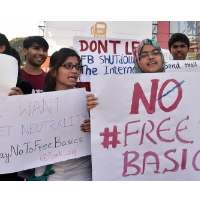Government Blocks Facebook Program for Low-Income Users
 Protesters in Bangalore (photo: Getty)
Protesters in Bangalore (photo: Getty)
By Vindu Goel and Mike Isaac, New York Times
SAN FRANCISCO — For years, Mark Zuckerberg has had a grander vision than just connecting the more than 1 billion people who already use Facebook: He wants to connect the entire world.
That effort hit a major roadblock Monday, when Indian regulators banned free mobile data programs that favor some Internet services over others.
The regulations, issued after months of intense public debate over how to extend the Internet to India’s poorest citizens, effectively block Facebook’s controversial Free Basics program in the country.
Free Basics offers people no-fee access to a text-only mobile version of the Facebook social network, as well as to certain news, health, job and other services. Facebook describes the program as a way to introduce the poor and the technologically unskilled to the potential of the Internet.
Even with that noble aim, Facebook miscalculated in introducing the program in India. While Facebook expected to be welcomed with open arms, its message to the country focused on itself rather than the broad coalition of telecommunications firms supporting the effort, experts said. That fostered a climate of distrust about Facebook’s future intentions in the country and led to the questions from regulators.
The program quickly became the target of critics, who said that it was an attempt to steer unsophisticated new Internet users to Facebook and other services working with the company. They argued that Free Basics and other so-called zero-rating programs — a set of apps or sites that a mobile operator or ISP does not charge customers to use — violated the concept of net neutrality.
“The phrase ‘no free lunch’ translates pretty well into a lot of different languages,” said Josh Levy, an advocacy director for Access Now, an international digital rights organization.
In a post to his own Facebook page Monday, Zuckerberg pushed back. “Connecting India is an important goal we won’t give up on, because more than a billion people in India don’t have access to the Internet,” he wrote.
“We know that connecting them can help lift people out of poverty, create millions of jobs and spread education opportunities. We care about these people, and that’s why we’re so committed to connecting them,” he wrote.
To Learn More:
Is Facebook’s Internet.org the Anti-Net Neutrality in Action? (by Steve Straehley, AllGov)
Supreme Court Upholds Cyber Freedom in India (by Karan Singh, AllGov India)
- Top Stories
- Controversies
- Where is the Money Going?
- India and the World
- Appointments and Resignations
- Unusual News
- Latest News
- India College Chain’s Expansion into U.S. Draws Opposition from Massachusetts Officials over Quality of Education
- Milk Shortages in India Tied to Release of New Movies Featuring Nation’s Favorite Stars
- Confusion Swirls around Kashmir Newspaper Ban in Wake of Violent Street Protests
- Polio-Free for 5 Years, India Launches Vaccine Drive after Polio Strain Discovery
- New Aviation Policy Could Increase Service, Lower Ticket Prices






Comments